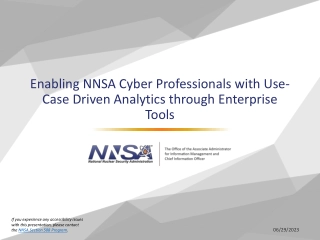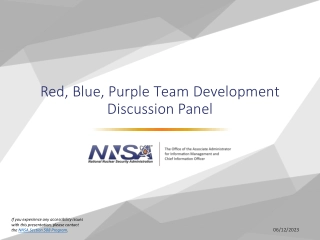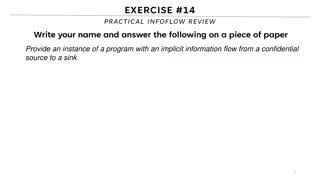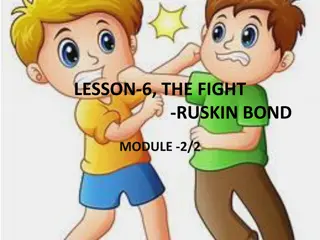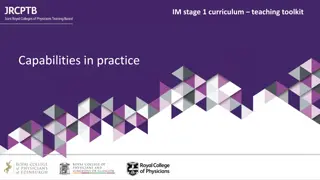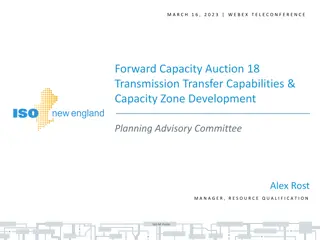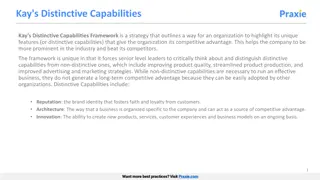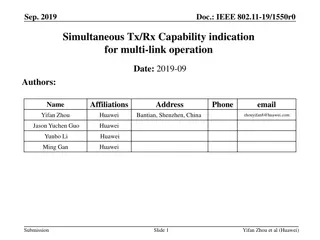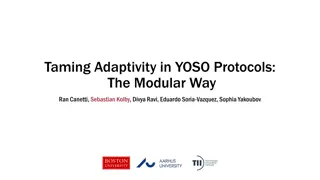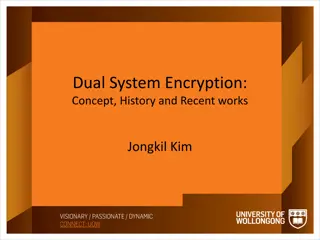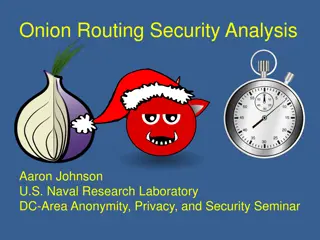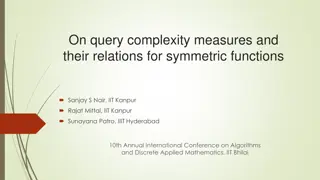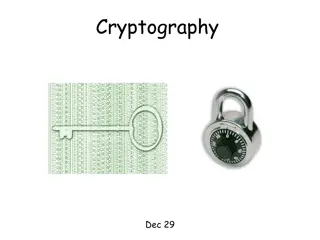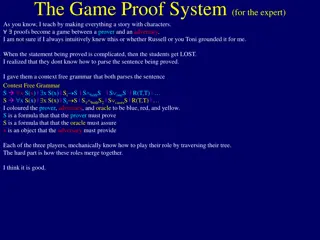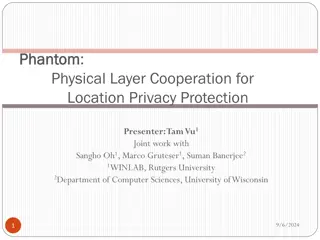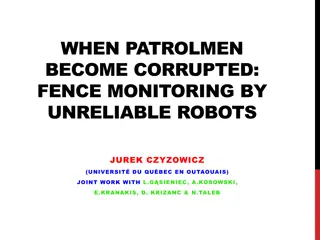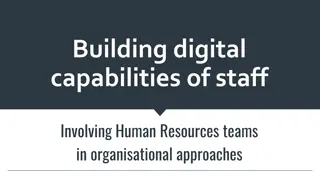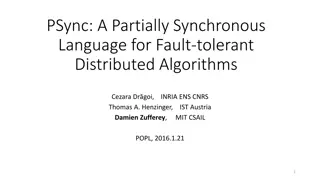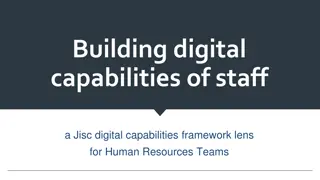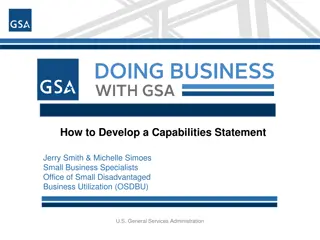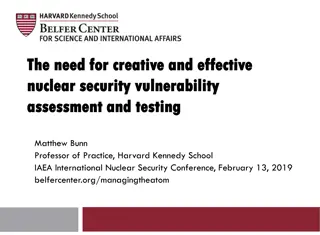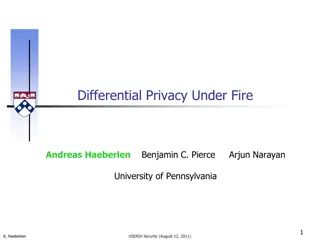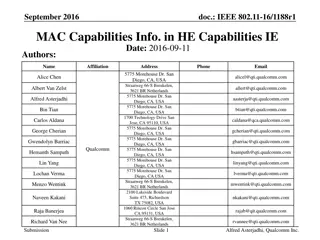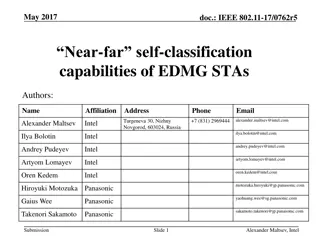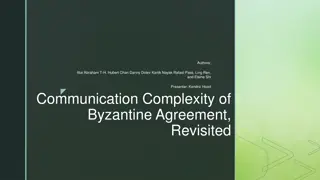Rescue Drone: Increasing Autonomy and Implementing Computer Vision
Focuses on developing a rescue drone with increased autonomy and implementing computer vision for advanced object detection. The team, consisting of Cody Campbell (Hardware Engineer), Alexandra Borgesen (Computer Engineer), Halil Yonter (Team Leader), Shawn Cho (Software Engineer), Peter Burchell (M
78 views • 44 slides
Empowering NNSA Cyber Professionals Through Enterprise Tools and Data Analytics
NNSA's Office of the Chief Information Officer is enhancing their cybersecurity capabilities by leveraging Enterprise Cybersecurity Data Integration architecture and strategic partnerships. This initiative focuses on expanding data sources, enabling correlation, and using resilient engineering for e
0 views • 10 slides
Red, Blue, Purple Team Development Discussion Panel
Explore best practices for team development in RBP security operations, focusing on operationalizing security focuses, assessing operator capabilities, implementing development pillars, and utilizing cyber ranges for hands-on skills training. Learn how to optimize security insight, architecture desi
0 views • 13 slides
Understanding Information Flow in Software Security
Explore the concept of information flow in software security, focusing on implicit data flows from confidential sources to sinks. Learn about threat models, side channels, and defending against potential attacks in practical contexts. Delve into the complexities of maintaining security while conside
5 views • 26 slides
Understanding Linux User Capabilities and Namespace Management
Linux user namespaces and capabilities play a critical role in managing system security and permissions. Users and groups are assigned unique IDs, and processes are associated with the user's ID. The kernel enforces permission checks based on user IDs and group IDs, allowing root access to bypass ce
0 views • 14 slides
The Fight - A Story of Friendship and Understanding
Ranji finds himself in a fight over the rights to a pool but ends up befriending his adversary through a series of challenges and understanding. Despite initial conflict, they learn from each other, eventually becoming friends and forming a bond over shared experiences.
0 views • 9 slides
Bankruptcy Motion Practice Essentials
Dive into the key aspects of bankruptcy motion practice, from contested matters to adversary proceedings. Learn about the rules and guidelines, required documents for motions, and best practices for drafting motions in bankruptcy cases.
0 views • 12 slides
Internal Medicine Stage 1 Curriculum Teaching Toolkit: Capabilities in Practice
Capabilities in Practice (CiPs) describe the professional tasks within the scope of internal medicine, utilizing expert assessors for assessment validity. There are 14 CiPs as learning outcomes for internal medicine Stage 1, with descriptors, performance levels, and evidence for entrustment decision
0 views • 11 slides
Update on Forward Capacity Auction 18 Transmission Transfer Capabilities
This update covers the progress and developments surrounding the Forward Capacity Auction 18 (FCA 18) transmission transfer capabilities, Capacity Zone Development, and ongoing analyses in New England's power system. The ISO-NE has been actively reviewing interface transfer capabilities, discussing
1 views • 25 slides
Developing Strategic Capabilities: A Guide to Aligning Strategy with Execution
Explore the importance of aligning capability-building activities with strategic intent in companies. Learn the three-step process of creating a blueprint, building, refining, and scaling distinctive capabilities to ensure strategic success. Utilize templates to design a capabilities system that enh
1 views • 21 slides
Exploring Att&ck Matrix: Engage Ludicrous Speed
Dive into the world of the Mitre Att&ck Matrix, where crazy ampersands and Trebuchet Font cues you in on how to engage Ludicrous Speed and understand the basics of attacker/adversary tactics, techniques, and common use cases. Explore matrices, prevent attacks, and work programmatically with Att&ck u
0 views • 26 slides
Enhancing Competitive Advantage Through Distinctive Capabilities Framework
The Kay's Distinctive Capabilities Framework provides insight into how organizations can leverage unique features to gain a competitive edge. By identifying distinctive capabilities such as reputation, architecture, and innovation, businesses can set strategic objectives, distinguish non-essential c
2 views • 4 slides
IEEE 802.11-19/1550r0: Simultaneous Tx/Rx Capability Indication for Multi-Link Operation
This document discusses the simultaneous Tx/Rx capability indication for multi-link operation in IEEE 802.11-19/1550r0. It covers scenarios where link selection depends on link capabilities, actions needed based on Tx/Rx capabilities, and methods to indicate simultaneous operation. The importance of
4 views • 10 slides
Abundant Life: Key to Success Through God's Help
Embrace the abundant life prepared for success through knowing that God sees, hears, and strengthens us. His help subdues our adversary, and Jesus advocates for us. Revelation of His thoughts empowers us to overcome challenges and achieve success, reflecting God's desire for our prosperity and victo
0 views • 10 slides
Taming Adaptivity in YOSO Protocols: The Modular Way
Explore the concept of taming adaptivity in YOSO protocols through a modular approach. The research delves into the efficiency, adversary adaptivity, role assignments, and compiler models in synchronous YOSO protocols. The visual presentations illustrate the framework, challenges, and strategies in
0 views • 19 slides
Dual System Encryption: Concept, History, and Recent Works
Explore the concept and history of dual system encryption, including the strategy of security proof, partitioning technique, and the adaptive security model. Understand how security is ensured through mathematical problem complexities and adversary challenges.
0 views • 29 slides
Location Privacy Protection Strategies: A Comprehensive Overview
This study delves into optimal strategies to safeguard location privacy against localization attacks in the realm of location-based services. Discussing the shortcomings of anonymization and obfuscation as standalone defenses, it explores the challenges and pitfalls in designing effective protection
0 views • 26 slides
IEEE 802.11-17/1373r1 PHY Security Overview
This document outlines the security requirements for the IEEE 802.11-17/1373r1 protocol, focusing on authentication, encryption algorithms, key management, and message integrity in both associated and unassociated states. It also addresses securing against adversaries with specified response times,
0 views • 10 slides
Analysis of Onion Routing Security and Adversary-based Metrics
In this comprehensive analysis, the security aspects of Onion Routing are scrutinized along with adversary-based metrics. Various security vulnerabilities such as compromised relays and potential attacks on the first and last routers are examined. Existing metrics like entropy coefficients and proba
0 views • 21 slides
Quantum Query Complexity Measures for Symmetric Functions
Explore the relationships between query complexity measures, including quantum query complexity, adversary bounds, and spectral sensitivity, in the context of symmetric functions. Analysis includes sensitivity graphs, the quantum query model, and approximate counting methods. Results cover spectral
0 views • 19 slides
Introduction to Cryptography: The Science of Secure Communication
Cryptography is the study of methods for sending and receiving secret messages securely. This lecture explores the application of number theory in computer science, focusing on the design of cryptosystems like public key cryptography and the RSA cryptosystem. The goal of cryptography is to ensure th
0 views • 53 slides
Game Proof System for Experts: Interactive Storytelling Approach
Teaching proofs as a game between a prover, an adversary, and an oracle using context-free grammar and character roles. This system helps students understand complex statements by breaking them down and providing interactive gameplay for better comprehension and engagement.
0 views • 14 slides
Adversarial Risk Analysis for Urban Security
Adversarial Risk Analysis for Urban Security is a framework aimed at managing risks from the actions of intelligent adversaries in urban security scenarios. The framework employs a Defend-Attack-Defend model where two intelligent players, a Defender and an Attacker, engage in sequential moves, with
1 views • 26 slides
Location Privacy Protection using Physical Layer Cooperation
The research presents PhantomPhantom, a system for protecting location privacy by leveraging physical layer cooperation. It explores the challenges of adversary localization systems and proposes solutions such as transmission power and frequency variations. The concept of creating ghost locations an
1 views • 13 slides
Understanding Spiritual Authority and Defeating the Devil
Explore the power of spiritual authority through five dimensions, including redemptive, inherited, positional, delegated, and empowered authority. Discover how to resist the adversary, the devil, who seeks to devour and attack through personal assaults and circumstances. Gain insights from passages
0 views • 23 slides
The Legendary Adventures of Beowulf
Beowulf is a courageous warrior who battles three formidable monsters - Grendel, Grendel's Mother, and a Dragon. He defeats each adversary with valor and strength, showcasing his prowess as a warrior and leader. As king of the Geats, Beowulf's heroic deeds and ultimate sacrifice inspire loyalty and
2 views • 11 slides
Boundary and Fence Patrolling in Robotics Research
Research by Jurek Czyzowicz and team focuses on patrolling boundaries with unreliable robots to prevent intrusions. They investigate agent deployment strategies to protect terrains efficiently. The study explores optimizing visit frequencies to environmental points and coordination methods for multi
0 views • 17 slides
Enhancing Digital Capabilities of Staff through HR Engagement
This presentation focuses on building digital capabilities of staff by involving Human Resources teams in organizational approaches. It outlines the purpose, aims, and a digital capability framework for HR activities. The slides provide insights into how HR teams can contribute to staff digital capa
0 views • 10 slides
Approximation Algorithms for Stochastic Optimization: An Overview
This piece discusses approximation algorithms for stochastic optimization problems, focusing on modeling uncertainty in inputs, adapting to stochastic predictions, and exploring different optimization themes. It covers topics such as weakening the adversary in online stochastic optimization, two-sta
0 views • 33 slides
PSync: A Partially Synchronous Language for Fault-tolerant Distributed Algorithms
PSync is a language designed by Cezara Drăgoi, Thomas A. Henzinger, and Damien Zufferey to simplify the implementation and reasoning of fault-tolerant distributed algorithms. It introduces a DSL with key elements like communication-closed rounds, an adversary environment model, and efficient runtim
0 views • 22 slides
Enhancing HR Teams' Digital Capabilities with Jisc Framework
This set of slides, created by Lou McGill with input from Abi Mawhirt, Head of People and Organisational Development at Dundee and Angus College, aims to assist HR teams in colleges and universities in building digital capabilities among staff. The slides provide a framework for aligning HR activiti
0 views • 10 slides
Developing a Strong Capabilities Statement for Small Business Specialists
A Capabilities Statement is a crucial marketing tool for businesses aiming to make a strong impression in their initial outreach efforts. Considered a business resume, it showcases your qualifications, past performance, and unique value proposition to potential clients. This guide explores the impor
0 views • 45 slides
Understanding the Operations of the Devil: A Biblical Perspective
The devil, known as Satan, is a key figure in the Bible with references in both the Old and New Testaments. This overview delves into his existence, personality, names, and deceptive nature, highlighting his role as the adversary of Christians. Believers and unbelievers face different challenges in
0 views • 38 slides
Jesus Overcomes Temptation in the Wilderness According to Luke 4:1-13
Jesus, filled with the Holy Spirit, faced temptation from the devil in the wilderness for forty days. The devil tried to lure Jesus with worldly power and possessions, but Jesus remained steadfast, quoting scripture and emphasizing the worship of the Lord. After enduring all temptations, Jesus emerg
0 views • 19 slides
Understanding Political Parties and Factional Politics
Political parties are groups with shared values aiming to win power through elections. They produce manifestos outlining their policies. Factions within parties may support different leaders or policies, influencing party dynamics. Parties play essential roles in shaping government policies and enga
0 views • 24 slides
Enhancing Nuclear Security Through Creative Vulnerability Assessment
Creative and effective vulnerability assessment and testing are essential in nuclear security to identify weaknesses and improve defense systems against intelligent adversaries. The need for in-depth assessment and realistic testing is emphasized to uncover vulnerabilities that adversaries may explo
0 views • 8 slides
The Challenges of Protecting Privacy with Differential Privacy
The article discusses the motivation behind using differential privacy to protect sensitive data while enabling useful queries. It highlights the promise of differential privacy, challenges faced, attacks on existing systems like PINQ and Airavat, and introduces a defense system called The Fuzz. The
0 views • 24 slides
IEEE 802.11-16/1188r1 MAC Capabilities Information September 2016
The document provides information on MAC capabilities in IEEE 802.11-16/1188r1, including details on HE capabilities IE. It includes author details, affiliations, addresses, and contact information. The content spans multiple locations, with contributions from various individuals representing differ
0 views • 19 slides
Near-far Self-Classification Capabilities of EDMG STAs
The document discusses the problem of near-far self-classification capabilities for EDMG STAs in IEEE 802.11-17/0762r5. It focuses on sorting STAs based on range and capabilities to prevent unnecessary transmissions and interference. The AP provides information for STAs to determine whether to use l
0 views • 10 slides
Communication Complexity in Byzantine Agreement Research
The presentation discusses communication complexity in Byzantine Agreement, emphasizing a lower bound of (f/2) when After the Fact removal is considered. It explores two major contributions - the communication lower bound in randomized protocols and near-optimal subquadratic Byzantine Agreement. The
0 views • 9 slides

